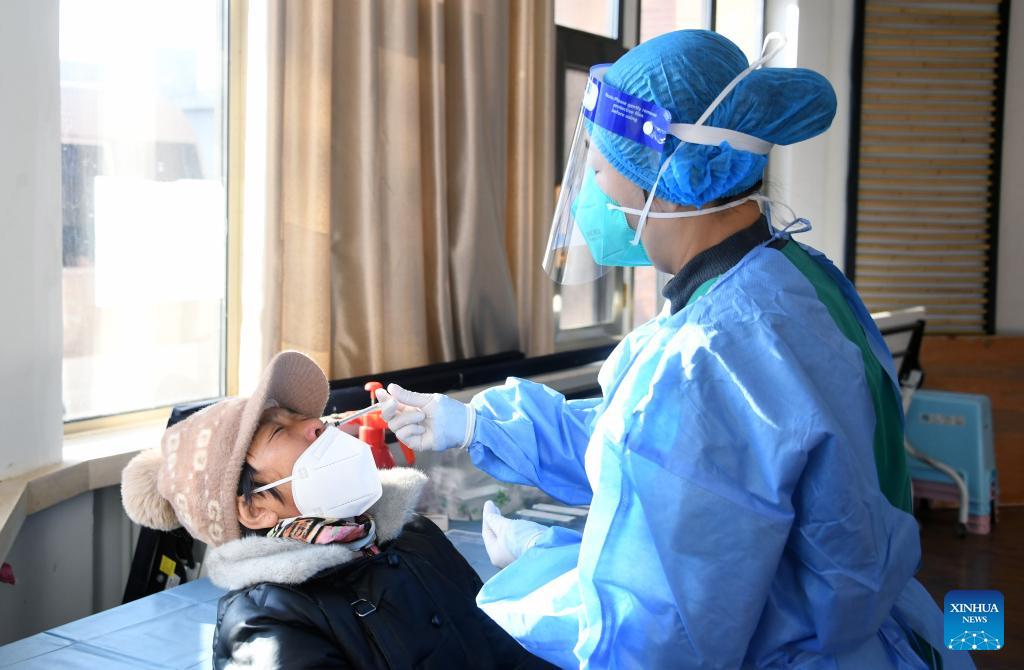More elderly get COVID vaccine jabs
 0 Comment(s)
0 Comment(s) Print
Print E-mail Xinhua, December 19, 2022
E-mail Xinhua, December 19, 2022

In the Shijingshan District of Beijing, a task force comprising two groups of five or six medics and community work staff is busy offering door-to-door vaccination services to elderly residents in need to help them fend off the virus at a peak of COVID-19 infections.
"We will first have a health assessment, asking them about their underlying health conditions and medical histories," said Luo Yan, a team member from the Beijing Rehabilitation Hospital affiliated with the Capital Medical University.
Based on the health assessment and with informed consent of their family members, the eligible will get a jab at home -- convenient and reassuring.
In China, over 90 percent of the population have been fully vaccinated. Almost 87 percent of people aged over 60 have been fully vaccinated, but only 66.4 percent of people over the age of 80 have completed a full course of vaccination.
"I strongly advise speeding up the vaccination of booster jabs, especially among the elderly and other vulnerable groups," said China's leading epidemiologist Zhong Nanshan.
Every percentage point rise in the vaccination ratio means 2 million more people being safeguarded against severe cases and potential deaths, according to health experts.
Elderly protection priority
China has shifted the focus of its COVID-19 response from infection control to case treatment with the objective of preventing severe cases. The elderly, with weakened immunity and mostly suffering from underlying medical conditions, are most susceptible to severe cases, prompting their protection from the highly-transmissible virus a priority.
"For the elderly with background diseases such as high blood pressure and diabetes, being infected would exacerbate their inflammatory response, worsening their diseases, and even leading to multiple organ failure," said Ding Zhen, director of the department of respiratory and critical care of a designated hospital in east China's Anhui Province.
Scientific research at home and abroad has confirmed the efficacy of vaccination in preventing severe cases and deaths from COVID-19, and elderly people usually reap the most benefit from it, said Xia Gang, an official with the national administration of disease prevention and control.
A study published in the medical journal Lancet Infectious Disease in October reveals that two doses of China's domestic inactivated vaccines are proven 70 percent effective in preventing severe cases for people aged 60 and above. The efficacy rate can reach 95 percent after a booster shot.
More accessible and convenient
With a population of 267 million aged above 60, China is accelerating vaccination among this group.
In late November, the country released a work plan to improve the vaccination rate among the elderly. Most of the requirements raised in the work plan are translated into actions now, with "green lanes" and movable vaccination stations set up in many cities and more efforts devoted to increasing the elderly's health awareness and keeping a close watch on their health conditions.
Earlier this week, the government announced a second booster dose of the COVID-19 vaccine to vulnerable groups who had received their first booster shot more than six months ago.
Efforts were also stepped up to help dispel people's related misunderstandings. Wang Huaqing, a leading Chinese immunologist, pointed out that not many people aged 60 and above have had adverse reactions to COVID-19 vaccination.
More and more gray-haired are willing to receive a vaccination that is accessible and to their convenience.
In the southern city of Guangzhou, community workers and volunteers helped the elderly dispel their misconceptions and ally their fears of getting vaccine jabs.
An elderly surnamed Ye said she and her husband were worried that their underlying health conditions would make them unsuitable for vaccination. But after hearing expert advice, they changed their mind and both got inoculated.
"Now we see that our concerns before are unnecessary," Ye said.
Zhong, the leading epidemiologist, said the push for vaccination among the elderly is necessary at the moment as the annual Spring Festival travel rush is about to begin. The upcoming Chinese New Year, the most cherished festival by the Chinese, falls on Jan. 22, 2023.
"After the vaccination takes effect in two weeks, the elderly will be better protected when the youngsters return home for the holiday," he said.






Go to Forum >>0 Comment(s)